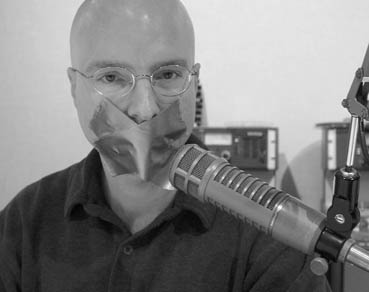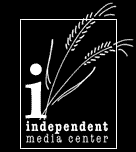|
 Once
upon a time, there was a little radio station in a bustling
university town. The station’s small staff labored mightily
to provide daily fare for a growing audience. The year
was 1939, and the future of the station seemed bright
indeed. Once
upon a time, there was a little radio station in a bustling
university town. The station’s small staff labored mightily
to provide daily fare for a growing audience. The year
was 1939, and the future of the station seemed bright
indeed.
“Recent improvements have more than doubled the potential
audience of the station,” trumpeted a local newspaper.
“A feature of the current schedule is the presentation
of several courses dealing in…Astronomy, American Literature,
Bacteriology in Every Day Life, Comparative Literature,
Contemporary Affairs, Farm Feeding, Farm Management,
Home Heating and Cooling, Kitchen Chemistry, Public
Speaking, Textiles, Weather and Climate, and three in
History.”
Alas, one day harsh words were spoken into a microphone
at the radio station, words of criticism and controversy.
We don’t have a recording of the fateful broadcast,
but as reported by the Daily Illini on October 19, 1939:
“Col. Lindbergh, Sen. Lundeen, and Father Coughlin were
lashed yesterday in a radio speech by R. R. Barlow,
professor of journalism. Speaking over the University
radio station WILL, Mr. Barlow cited these prominent
men as exemplary of the many insidious propaganda sources
in America causing a swing of sentiment toward Germany
and her ideology.”
These words found their way to the desk of Mr. James
M. Cleary, a wise and powerful member of the University’s
Board of Trustees. Mr. Cleary saw his duty and acted
at once. He fired off a memo to University President
A. C. Willard.“(T)he direct quotations from him were
quite as opinionated, quite as controversial, quite
as much matters of opinion rather than of fact, as are
the statements of the men he criticized,” the Trustee
declaimed. “This will probably be inevitable in future
talks if members of the faculty are to be given the
privilege of expressing their opinions over WILL as
to current local politics, current state politics, current
national politics, and current international politics.
I believe that such discussions are entirely unnecessary,
unfair, and dangerous to the welfare of the University.”
In keeping with university tradition, the matter was
referred to a committee. Following a series of letters,
meetings, and misgivings, the Advisory Committee on
the Radio Station proposed a revision to the Statement
of General Policy governing all broadcasts on WILL.
The proposal was cleared by Cleary, and approved by
the full University of Illinois Board of Trustees on
December 18, 1939. The salient chapter and verse became
known as Term Number 7 of the Statement of General Policy:
As approved by the Board of Trustees:
7. Subjects of a controversial nature will be presented
only after approval of speakers and program by the President
of the University. Within a reasonable time after such
controversial program, opportunity will be given for
the presentation of other viewpoints, if requested by
their proponents.
I. Interpretation
(1) In general, subjects will be held controversial
when they represent issues of current interest on which
public opinion is sharply divided or sensitive.
(2) The following subjects are recognized to be controversial
and their discussion over the Station will not be permitted:
(a) Partisan political issues.
(b) Sectarian religious questions
(c) Questions involving equality or relationship of
races.
University archives contain numerous
letters to and from WILL Director Josef Wright and University
President Willard negotiating clearance of “controversial”
programs. Our trusty Trustee Mr. James M. Cleary, who
once served as Director of the commercial radio station
WGN, must have been well pleased.
*****
Censorship can take many forms. The
most obvious kind actively suppresses certain information
or points of view. Much more subtle, are the failures
of producers like me to listen to the stories and perspectives
of people and interests throughout our community, and
to make sure they are reflected in what we broadcast
on WILL. I’ll confess right now that those of us who
produce public radio are guilty of this kind of censorship
on a daily basis.
What is at stake? How many wars are being waged? What
is the state of our environmental health? How many children
are hungry and alone? How will a half-billion dollars
in state budget cuts affect health care in Illinois?
What happened to Russia’s weapons-grade fissile material?
How many questions like this are there?
Since 1987 it has been my job to identify and dissect
such questions, and to find knowledgeable people to
discuss them. Fortunately there are plenty of both,
because the deadlines for airtime never cease. Weekly
we produce about 20 hours of live interviews, several
lengthy in-depth news features, and dozens of newscasts.
We also make choices about what to air from National
Public Radio, Public Radio International, the BBC, the
CBC, Illinois Public Radio, Pacifica, the Great Lakes
Radio Consortium, and other independent producers and
cooperatives. How do we make these choices? I’m good
with questions. Answers are more difficult.
*****
I had been trying to get a commitment
from a certain U.S. Senate candidate to spend an hour
on Focus 580. It’s really an hour of being interviewed
by prospective voters and constituents, the people he
may represent in Washington for the next 6 years. It’s
about public dialogue on vital issues, and really nothing
less than democracy itself, and so I believe as I argue
with the candidate’s press secretary. “Tell you what,”
he says. “We can give you 15 minutes of the candidate’s
time, uninterrupted.” No way, I say, because we’re offering
all the candidates the same thing: one hour to talk
about the issues. Any less would shortchange the audience
and the candidate too. We need enough time to cover
as many issues as possible. “That’s okay,” says the
flack. “The candidate only needs 15 minutes to cover
everything he has to say.”
*****
Weekly editorial meetings are often
a waste of time. We talk about who will cover what air
shift, our continuing struggles with broken technology,
and what we’re working on at the moment. The meetings
serve as a ritual to mark the passage of yet another
week, the pages falling from the calendar like so many
leaves from a tree. Is this the autumn of life in public
broadcasting? We have all been here before, same time
next week! Our editorial meetings fulfill the purpose
of similar meetings everywhere, giving their attendees
a shared sense of grievance at having to attend them.
Most of the real discussions about programming and balance
occur at work throughout the day. Decisions are made
every moment. Each begins with a conversation. We expect
that every member of the community has a share in that
conversation. We remind you incessantly to call, on
the air and off, send letters, e-mail, respond, compliment,
argue. We hope you pay attention to what we broadcast
and put on our web site, but we also want you to read
books, newspapers, even watch TV, talk with your friends,
join a group, form a consensus, engage in dissent, do
all the things necessary to keep pushing for democracy
and civilization. We absolutely must discuss subjects
of a controversial nature, especially “partisan political
issues, sectarian religious questions, and questions
involving equality or relationship of races.” It’s not
easy for any of us.
*****
Does anyone remember the war in Panama?
It was during the first Bush administration, that of
George the Elder, who in a past life as CIA director
had maintained good relations with our asset in Panama
City, Manuel Noriega. In that conflict National Public
Radio kept referring to “Panamanian Strongman Manuel
Noriega.” What the hell is a Strongman? Manuel Noriega,
“the Panamanian Strongman,” the newscaster intoned.
Some may think the phrase simply convenient, nothing
to think about twice. Others would point out that if
NPR will help redefine our former ally as a drug-running
thug, a “strongman,” the propaganda war is already won.
Critics of public broadcasting on the right continue
to charge that NPR represents only the anti-American
loony left. We were not supposed to ask questions about
American conduct of the invasion of Panama. Amid the
celebration of American military superiority, did anyone
notice how many innocent Panamanians died? No mainstream
news organization would even touch the question, “Why
are we really in Panama?” Independent filmmaker Barbara
Trent did, however, and won an Academy Award for her
documentary “The Panama Deception.” (WILL interviewed
Barbara Trent twice on the subject.)
The U.S. invasion of Panama was the first full dress
rehearsal for the new style of media management during
war operations. Reporters are denied direct access to
the theater, but given enough images and sound bites
to satisfy the requirements of their editors. CNN loves
video from the nose of a smart bomb. The technique was
further refined during the Persian Gulf War, and deployed
effectively once again in Afghanistan. And since September
11, with the success of the ‘war on terrorism’ at stake,
no one can even question the process.
*****
Critics of public broadcasting, NPR,
and WILL abound on the left as well. And I really think
that’s as it should be. Our aim is to reflect a diversity
of views, not one view that we somehow claim is the
correct one. As a society we need to discuss difficult
subjects, and it won’t be comfortable but it’s our only
hope for resolving them. If you hear something on WILL
that makes you mad, just wait until tomorrow. We’ll
probably make you even madder.
Several years ago, during the first Intifada, Focus
580 aired a series of discussions about Israel and the
Palestinians. Some people in the community didn’t like
some of the interviews, and threatened to withdraw their
support and that of their friends from the station.
As the producer, all I can do is try to provide balance
and depth by covering a variety of angles with credible
guests. I drew up a list of all the interviews we had
done over the past year on the Middle East, and those
we had scheduled for the weeks ahead. After viewing
the list, all agreed that we had probably angered both
sides about equally. The complaint was withdrawn.
Another controversial issue, another irate caller. This
one says he’s listened to WILL for years and years,
and has enjoyed untold hours and learned many things.
But an interview we aired yesterday bothered him so
much that he will never support WILL again. Whose loss
is that?
*****
The point of this piece was supposed
to be how WILL makes programming decisions given the
needs of our local community, and the balance of national
programming from NPR. I could write a PR piece that
says how great we are, but the reality is that we fail
daily. We try hard constantly. But the need is too great,
there are too many vital issues to discuss, and the
trends we think are important today may be superseded
by more important trends next week. Each of us has only
one small vantage point from which to try and make sense
of everything. That’s why we need all of us, because
each can see something the rest of us miss.
So I’ll leave you with this: The only way WILL can be
great as a community media resource is through participation
by the entire community. This means that if you know
something important - a fact, an issue, an event, or
a trend - let us know it, too. If you think we’re missing
an important perspective, we count on you to tell us.
The good news is that we no longer have to follow Term
No. 7 of the Statement of General Policy. The bad news
is that you have producers like me, with my own limited
perspective on the world, making the programming decisions.
I’ll try as hard as I can if you help.
Jack Brighton is the producer of
Focus 580 on WILL-AM radio. He has been at WILL since
1987.
|
|





